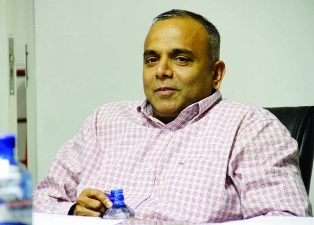
JULY 31 has become an important date on Zimbabwe’s political and financial services sector calendar.
BERNARD MPOFU
On this very day, Zimbabweans could cast their votes, would President Robert Mugabe’s initial proclamation on the election date stands.
Mugabe, through Justice minister Patrick Chinamasa, approached the Constitutional Court (Concourt) seeking an extension to the poll date after regional bloc, Sadc, advised the veteran leader to extend the election date by a minimum of two weeks following concerns by the two MDC formations over outstanding democratic reforms ahead of the polls.
The Concourt was supposed to have handed down a ruling tomorrow, but the case has since been deferred indefinitely.
The harmonised elections are expected to mark an end to the inclusive government formed after a widely contested presidential election runoff marred by violence.
Turning to the banking sector, Reserve Bank of Zimbabwe (RBZ) governor Gideon Gono will also be racing against time to present his final Monetary Policy Statement (MPS) before his second term as central bank chief expires on November 30.
The MPS is expected to have been delivered by July 31.
- Chamisa under fire over US$120K donation
- Mavhunga puts DeMbare into Chibuku quarterfinals
- Pension funds bet on Cabora Bassa oilfields
- Councils defy govt fire tender directive
Keep Reading
For many, three words — good, bad and ugly — will continue to resonate at the legacy left by Gono.
Gono’s parting shot comes at a time when the hunt for capital by local banks has intensified as the central bank deadline looms.
Financially sound FBC Holdings will today seek shareholder support for a capitalisation programme which will result in a merger between its flagship commercial bank and building society in a bid to raise capital.
Capital-rich National Social Security Authority (NSSA), which has shareholding in many local banks including merchant bank Capital Bank, was this week quoted as saying it had plans to collapse Capital Bank’s operations as the future of merchant banking looked bleak.
Reports show that NSSA or its nominee company is set to apply for a microfinance bank licence, as it moves away from the merchant banking business that has failed to deliver profit.
Calls for banks to merge have fallen on deaf ears. NSSA had proposed that banks in which it has shareholdings should merge and create one institution, arguing that it had no money to capitalise each bank. This plan was shot down by executives ostensibly on the basis that the institutions have different clients and as such it was unwise to merge them.
Despite having many banks, the economy is still underbanked as evidenced by the FinScope survey released last year which showed that more than a quarter of the respondents (27%) keep all their savings at home.
Unlike in the past, this year banks have kept a tight lid on their capitalisation plans after Gono imposed a media ban.
Analysts are now reading in between the lines through cautionary statements issued by the banks. Some have for months been recycling statements indicating dim prospects of raising capital.
Foreign banks, though appearing capable of meeting the revised threshold, seem to be closely following political developments before their shareholders fully commit capital injections.
Already, banks are key targets under the indigenisation and empowerment regulations compelling foreign-owned companies to sell controlling stakes to locals.
Genesis Investment Bank has already surrendered its banking licence after it became apparent that it would not raise the capital.
Among some of the banks that failed to raise $25 million by last December are State-owned Agribank, FBC Building Society, ZB Building Society, Allied Bank (formerly ZABG) and Capital Bank (formerly ReNaissance Merchant Bank).
The central bank, however, said banks had shown “significant progress” towards raising the prescribed capital.
Local banks are, however, expected to partially comply with the staggered recapitalisation exercise by June before increasing the capital levels to $100 million by June 2014.
Commercial banks, for instance, should raise a minimum of $50 million.
Indications are, however, that Gono will extend the compliance deadline as it emerges that mainly locally-owned banks are struggling to raise the capital due to liquidity constraints besetting the economy.
Critics say uncertainty surrounding the election date is also scuttling plans to raise capital.
Following his upward revision of the minimum capital requirements, then acting Finance minister Gorden Moyo said Cabinet had resolved that no local bank should fold due to new capital threshold.
In March this year, Gono, who initially had said he had no appetite to place any bank under curatorship, said the apex bank had extended the compliance timeline for meeting minimum capital requirements for the banking sector from next year to 2020, amid indications that some banks were struggling to comply due to empowerment regulations.
Addressing business leaders at the Confederation of Zimbabwe Industries breakfast meeting in Harare, Gono, three months ago, said biting liquidity constraints confronting the economy had made it impossible for weaker banks to raise capital locally.
“We are also mindful of the fact that some of the investors are from outside and they may be concerned about issues to do with indigenisation if they are to put in money that upsets what is on paper in terms of indigenisation. That may be the reason why certain transactions take long, but we will remain flexible,” Gono said then.
“As a result of that, we have come up with what we have called ‘Vision 2020,’ where we expect banks to have complied by 2020. We are urging industry also to come up with their 2020 visions. By the way, 2020 is not too far away in terms of weeks (I think if my arithmetic is correct, as of today, we are looking at 408 weeks to get to 31 December 2020). We need to plan, how we are going to get to that year, we have planned and we are saying 31 December 2020. “I would like to see a banking sector that is fully capitalised to the tune of $100 million, a banking sector where a simple bank is capable of underwriting eight times its capital base, which will then be $800 million dollars. So I will say, let’s get on with it and let’s plan to survive despite the challenges that can get on our way.”










